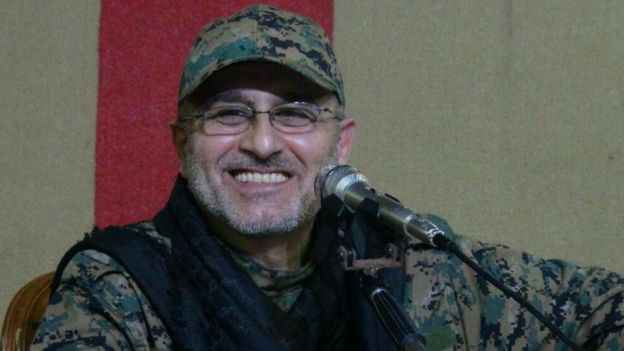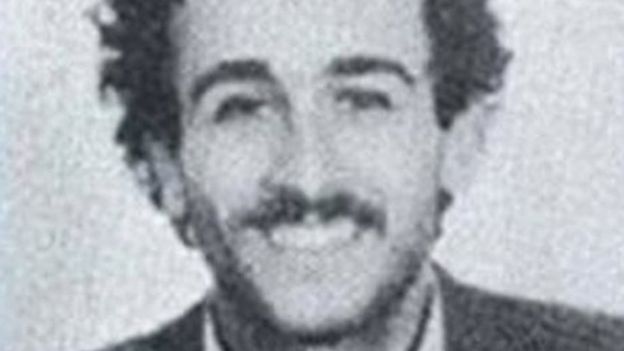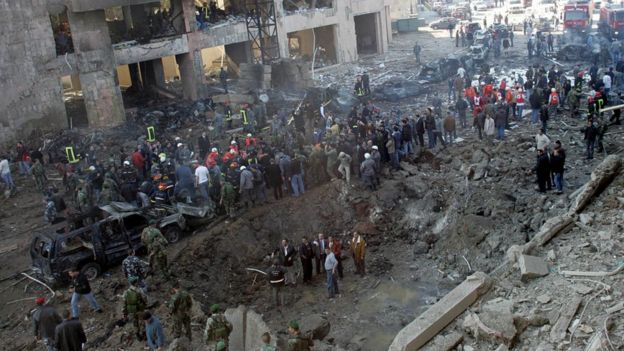The man believed to be Hezbollah’s most senior military commander in Syria’s war has been killed in Damascus.
Mustafa Amine Badreddine died in a large explosion near Damascus airport, the Lebanon-based militant group said in a statement on its al-Manar website.
Hezbollah supports Syria’s President Bashar al-Assad and has sent thousands of fighters into Syria.
In 2015, the US said that Badreddine was behind all Hezbollah’s military operations in Syria since 2011.
The US treasury, which imposed sanctions on Badreddine last July, said at the time he was behind the movement of Hezbollah fighters from Lebanon to Syria, and was in charge of the key battle for the town of al-Qusair in 2013.
Badreddine was also charged with leading the assassination of former Lebanese PM Rafik Hariri in Beirut in 2005.
An initial report by Lebanon’s al-Mayadeen TV said that Badreddine, 55, died in an Israeli air strike.
But a later statement by Hezbollah on al-Manar’s website did not mention Israel.
Israeli media reported that the government refused to comment on whether it was involved in Badreddine’s death.
Israel has been accused by Hezbollah of killing a number of its fighters in Syria since the conflict began.
The group was established in the wake of the Israeli occupation of Lebanon in the early 1980s, and has called for the “obliteration” of Israel.
 Image copyrightAFP/HEZBOLLAH MEDIA OFFICE
Image copyrightAFP/HEZBOLLAH MEDIA OFFICE Image copyrightREUTERS
Image copyrightREUTERSA number of Twitter accounts supporting Syrian rebel groups and the al-Qaeda-affiliated al-Nusra Front say Badreddine was killed in a battle in Khan Touman, southern Aleppo, rather than in Damascus.
Khan Touman was captured by a coalition of groups including al-Nusra Front last week and has been subject to heavy shelling in recent days.
No official sources have commented on the reports.
Born in 1961, Badreddine is believed to have been a senior figure in Hezbollah’s military wing.
He was a cousin and brother-in-law of Imad Mughniyeh, who was the military wing’s chief until his assassination by car bomb in Damascus in 2008.
According to one report, a Hezbollah member interrogated by the Canadian Security Intelligence Service (CSIS), described Badreddine as “more dangerous” than Mughniyeh, who was “his teacher in terrorism”.
They are alleged to have worked together on the October 1983 bombing of the US Marine Corps barracks in Beirut that killed 241 personnel.
Badreddine is reported to have sat on Hezbollah’s Shura Council and served as an adviser to the group’s overall leader Hassan Nasrallah.
 Image copyrightAP
Image copyrightAPBadreddine was tried in absentia by the ongoing Special Tribunal for Lebanon, in The Hague, over the killing of Mr Hariri.
He was indicted on four charges and was said by the tribunal to be “the overall controller of the operation” to kill Mr Hariri.
Three other Hezbollah members also stand accused of their role in the assassination.
The indictment also details Badreddine’s role in bombings in Kuwait in 1983, that targeted the French and US embassies and other facilities, and killed six people.
He was sentenced to death over the attacks, but later escaped from prison.
Key questions
What is Hezbollah doing in Syria?
The Lebanese Shia Islamist movement has played a major role in helping Iran, its main military and financial backer, to prop up the government of Syrian President Bashar al-Assad since the uprising erupted in 2011.
Thousands of Hezbollah fighters are assisting government forces on battlefields across Syria, particularly those near the Lebanese border, and hundreds are believed to have been killed.
Who could have killed Mustafa Badreddine?
Any of the armed groups seeking to overthrow Mr Assad might have sought to kill the man co-ordinating Hezbollah military activities. However, suspicion is likely to fall on Israel, which fought a war against Hezbollah in 2006.
Israel has been accused of killing several of the group’s leaders over the years, although it has never officially confirmed its involvement.
Hezbollah military chief Imad Mughniyeh was killed in a car bombing in Damascus in 2008 that US intelligence officials said last year was a joint operation by the CIA and Israel’s Mossad spy agency.
In January 2015, a suspected Israeli air strike in the Syrian Golan Heights killed six Hezbollah fighters, including Mughniyeh’s son Jihad, and an Iranian Revolutionary Guards general.
And in December, Hezbollah said one of its senior figures, Samir Qantar, was killed when missiles fired by Israeli jets struck a block of flats in Damascus.
Israel has also reportedly conducted air strikes aimed at preventing advanced weapons shipments from Iran from reaching Hezbollah via Syria.





